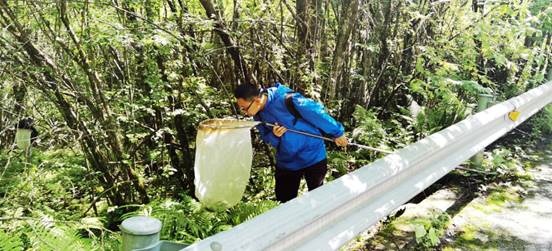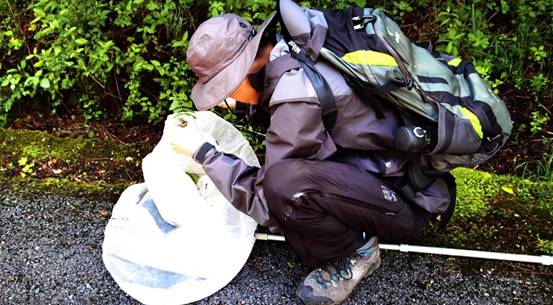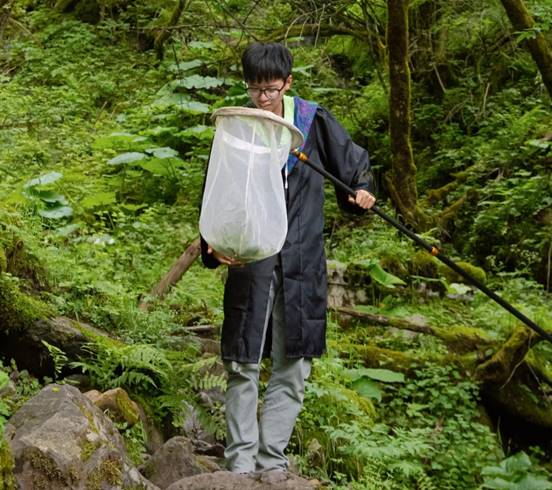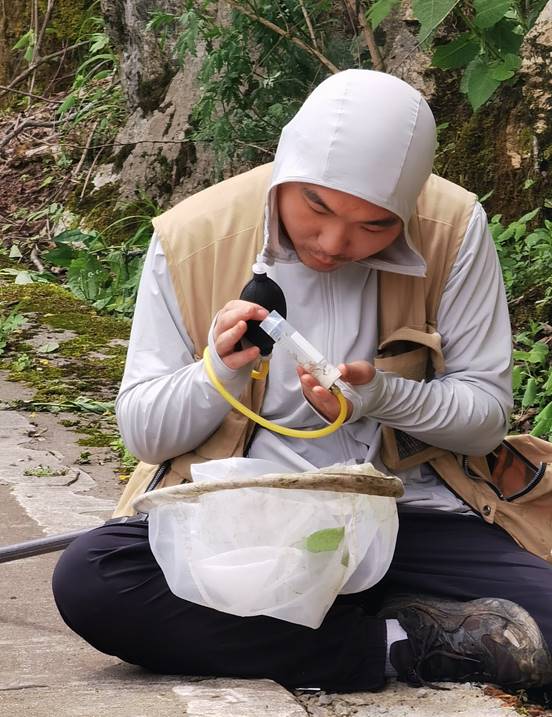The Future Ambassadors of China’s Entomology
Updated:2023-07-06 Source:Shennongjia National Park
Zhang Junru, Lei Qilong, Zhang Wenzhe, Xie Zhen, Xiong Haoyang, and Liu Huaiyu…
In order to conduct a comprehensive three-year background resource survey of Shennongjia, nearly one hundred entomology experts and their graduate students from all over China gathered at Shennongjia National Park in early June of 2023. They have been meticulously surveying the insects inhabiting over 3,000 square kilometers of land here. During our visit to Shennongjia National Park, we had the privilege of meeting them. Though our encounter was brief, their unwavering dedication left us deeply impressed.
A Wealth of Knowledge about Insects
On the several-mile stretch from Xiaolongtan to Jinhouling, the roadside was adorned with tall forests as well as shrubs and vine plants covering the slopes on both sides. The sunlight illuminated this forest early in the morning, allowing the organisms here to bask in its warmth.
“After two days of continuous rain, the insects are hiding now. But soon they will come out to enjoy the sunny weather and replenish their energy”, said Liu Huaiyu from China Agricultural University. “With ample sunlight, the temperature in this area rises quickly. Insects tend to gather here, and it offers an open space for us to put up our insect nets safely for survey purposes”, added Xiong Haoyang. As they walked, they swung their insect nets through the leaves of the plants, startling various insects into flight above the plant branches and the paths. They then stopped and examined the catch in their nets. Every now and then, we could hear the sound of their excited voices, suggesting that they had successfully caught a particularly rare and elusive insect.
 Liu Huaiyu was examining the captured insects along the way.
Liu Huaiyu was examining the captured insects along the way.“This is a sawfly (Tenthredinidae), and most sawflies are harmful to crops and forests.”
“In people’s minds, insects are often seen as prey for birds, frogs, lizards, and other animals. However, the insect world also has its own food chain. Some insects are herbivores, while others are carnivores. Just like other animals, herbivores tend to be at the bottom of the food chain, while carnivores are at the top.”
“These butterflies are not resting on the rocks. They are actually feeding on the salt deposited on the rocks.”
"The mayfly (Ephemeroptera), with a cake-like structure on its head, is a rare sight as it has extremely specific requirements for water quality. These conditions are not often found, rendering the mayfly a rarely seen insect.”
“The spittlebug nymphs hide in their frothy secretions, which have a strong odor. The nymphs use these secretions to protect themselves from harm.”
...
Each captured insect was treasured by these scientists, and their extensive knowledge about the characteristics and habits of these insects was truly remarkable. It is as if, through studying just one insect, they can unlock an entire world of knowledge, while many of us struggle to even remember the names of these intriguing creatures.
A Deep Reverence for Insects
Their conversations sounded like ancient scripts to us—incomprehensible, yet fascinating. Silently, we followed their footsteps, recording the knowledge they shared. As I took notes and reflected, I was deeply moved by their passion. These insect enthusiasts, immersed in the world of these tiny creatures day after day, year after year, could not help but talk about insects along the way. They would chase after insects, capturing their every move. Some sat down, lost in thought, surrounded by various insect specimens. How could they remain so enthralled and not grow weary?
It was not until I observed Lei Qilong from China Agricultural University catch insects that I found the answer.
He seemed to be on the hunt for a minuscule insect, swiping his net through the foliage, then pausing to examine the contents. With his head almost buried in the net, he was undistracted by passing vehicles or our conversations. Suddenly, a triumphant exclamation burst from his lips. It grabbed our attention and drew us closer. We saw a net adorned with a vibrant array of insects. It was difficult to discern which one had made him so excited. He then eagerly pointed to a delicate white fly and adroitly deposited the little fly into a slender centrifuge tube with 95% alcohol. I marveled at his skillful dexterity: How could he capture the minuscule creature with his thick fingers and transfer it into a new abode completely unscathed?
 Lei Qilong was carefully examining his captures.
Lei Qilong was carefully examining his captures.While Lei Qilong continued to search through the catch in his net, a butterfly landed on his left index finger, avidly sipping the saltiness from his fingertip. He didn’t get distracted but said proudly, “You see, my work is so demanding that my fingers are coated with sweat and salt.” He showed no intention of disturbing the butterfly, allowing it to freely indulge until it had its fill and fluttered away. After a while, a caterpillar crawled onto the back of his hand, its wriggling body sending shivers down my spine. I scoured the ground for something to help him remove this disgusting creature. To my surprise, he stopped me and said, “It’s okay. I’ll take care of it.” With a slender grass stem, he delicately passed it beneath the caterpillar’s belly and gently lifted it, placing it back on the ground. I was completely taken aback. In a situation like this, most of us would instinctively swat at the caterpillar and stomp on it. But Lei Qilong cherished and respected these tiny lives. In my eyes, he had reached a higher level of coexistence with insects.
Full Devotion to Their Work
Xiong Haoyang, a young man from Sichuan, brimmed with passion, always wearing a smile on his face. This trip to Shennongjia held a special significance for him—it was his first collection assignment as a graduate student in the College of Plant Protection at China Agricultural University.
In fact, he hadn’t yet finished his graduation ceremony as an undergraduate in Forest Conservation at Chongqing Normal University before he participated in this collection activity that coincided with his graduation season. He brought his graduation gown and chose a specific day to put it on. The photographer Liu Huaiyu took a series of work photos for him. He swung his net, capturing insects in the mountain gorges and valleys. He shared these special graduation photos on his WeChat Moments to demonstrate his grand ambition of dedicating himself to the study of entomology.
When Wei Cong, a teacher from Northwest A&F University, saw his special graduation photos, he forwarded them and commented with emotion, “A lovely young man, always energetic! The group of Haoyang, Qilong, Huaiyu, and Junru is fantastic! They are unbeatable in the insect collection process! If we were to plan a Chinese insect-themed Spring Festival Gala, they would be the brightest on the stage! Congratulations to Professor Li Hu from China Agricultural University for recruiting such an excellent student!"
 Xiong Haoyang's graduation season marked the beginning of his dedication to the field of entomology.
Xiong Haoyang's graduation season marked the beginning of his dedication to the field of entomology.Let’s delve into the story of Zhang Junru, a doctoral student at Northwest A&F University. The previous afternoon, I came across his blog post, wherein he shared his experiences with his supervisor. His blog post showcased his evolving understanding of insects, from a superficial understanding to a profound appreciation for them. He also expressed his ambition to contribute to the field of entomology in China, which resonated deeply with me. Coincidentally, Zhang Junru was assigned to the same group with me and was collecting solo in Jinhouling that day. I was eager to meet him, so I made my way to Jinhouling alone.
 Zhang Junru was fully engrossed in his discoveries.
Zhang Junru was fully engrossed in his discoveries.As I rounded a bend on the mountain road, I spotted a man sitting by the roadside, holding a suction tube and intently examining something. Without disturbing him, I discreetly zoomed in with my camera and captured a close-up shot of Zhang Junru, diligently at work in the Shennongjia National Park. I asked, “Excuse me, are you Zhang Junru?” He looked up, briefly acknowledging, “Yes, I am!” and then swiftly returned his gaze to the suction tube. That fleeting moment of eye contact and his unwavering focus reminded me of what he had written in his blog: “An inexplicable sense of urgency threatens to engulf me. I need to work and stay busy, for only in being occupied does my time acquire value, and my existence truly materialize in this world.” “Nature is my mentor and my dear companion. It guides me towards the deeper scientific mysteries. I feel unparalleled joy, as collecting becomes a source of happiness again and again. Whenever I think about the myriad tasks that lie before me, my passion ignites, and I find myself working with renewed vigor.” Thinking of these words, I left him undisturbed, allowing him to immerse himself in his work and contemplation.
At noon, Director Du Hua of Shennongjia National Park offered to drive them back to Xiaolongtan for lunch, at the foot of the mountain. However, Zhang Junru politely declined, saying, “I won't be having lunch there. I've brought my own steamed buns. I would like to continue collecting for a while longer in the good weather.”
It is the unwavering dedication and sense of responsibility that truly defines those who achieve great things in their field. Their internal drive is fueled by their ideals, love for their work, and selfless devotion. Everyone involved in this resource survey in Shennongjia shares this same passion and ideal. They diligently work towards their mission and make the most of their time. As I return and reflect on the continuous rain outside my office window, I am filled with deep admiration. With so many experts and scholars who hold a profound love for nature and a commitment to studying it, the conservation of China's ecosystems and biodiversity resources will undoubtedly continue to improve. I hold great respect for them and eagerly anticipate their contributions as the future ambassadors of China's entomology like Fabre, the entomology legend and pioneer. (By Joseph Ma, Jessie Ning, Du Hua, Xiao Long)
Note: Jean-Henri Casimir Fabre (December 22, 1823-October 11, 1915) was a French naturalist, animal behaviorist, entomologist, science popularizer, and writer. He wrote “Souvenirs Entomologiques” (Insect Memoirs), which is considered a pioneering work of modern entomology. Fabre’s research was especially focused on the order Hymenoptera, Coleoptera, and Orthoptera. He is known as the “poet of science” for his beautiful and lyrical writing style.
Copyright Shennongjia National Park
Address:36 Chulin Road, Muyu Town, Shennongjia Forestry District, Hubei Province 鄂ICP备18005077号-3
Address:36 Chulin Road, Muyu Town, Shennongjia Forestry District, Hubei Province 鄂ICP备18005077号-3
Email:2673990569@qq.com
Phone:0719-3453368
Phone:0719-3453368


TOP

